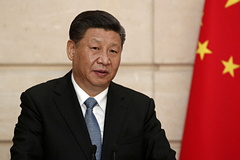NYT: Chinese political elites face disagreements over uncertainty over Xi Jinping's successor

Xi Jinping. Photo: Yoan Valat / Reuters
China may face unrest and divisions among local political elites due to existing uncertainty over the future successor of Chinese President Xi Jinping. The New York Times predicted such problems for the country.
As the newspaper notes, Xi Jinping, in anticipation of his next term at the head of state, does not seek to name the name of a politician who could become his successor when he nevertheless decides to leave China's highest public office. Thus, he may strengthen his position before he runs for a third term, and also get more time to get accustomed to potential heirs in his entourage, the newspaper writes. However, at the same time, this may contribute to the growth of discontent in inner-party circles.
According to expert Bo Zhiyue, who specializes in Chinese domestic politics, Xi Jinping is already faced with a dilemma: he must start promoting a number of politicians who could replace him as president in the future, but does not want to support someone too actively, so as not to lose influence. At the same time, those who were previously considered the favorite, including Chen Miner, a member of the Politburo of the CPC Central Committee, will already be too old to claim the role of Xi Jinping's heir in 2027. As a result, the head of the PRC will have to choose a successor from among younger politicians who have not yet been sufficiently tested.
It is assumed that Xi Jinping may introduce potential candidates to the narrower circle of the Politburo standing committee, as his predecessors did, or include them in the expanded Politburo. Most likely, the PRC chairman will rely on loyal officials aged 50 to 60, many of whom currently hold the positions of provincial leaders.
A scenario is also possible in which Xi Jinping will remain at the head of China not for another five years, but for ten or more. In this case, a potential successor will be chosen from among even younger politicians who currently work in various ministries and local administrations and have not yet managed to declare themselves at a higher level.
In 2018, deputies of the National People's Congress (NPC) approved amendments to the constitution, allowing to be elected to the presidency of the PRC without restrictions every five years. Thus, Xi Jinping actually received the right to hold his position for life.
Xi Jinping became General Secretary of the CPC Central Committee in 2012, and President of the People's Republic of China in 2013. In November 2017, he was re-elected General Secretary of the Central Committee of the Communist Party, the charter of the CPC does not provide for restrictions on holding the highest party post.

